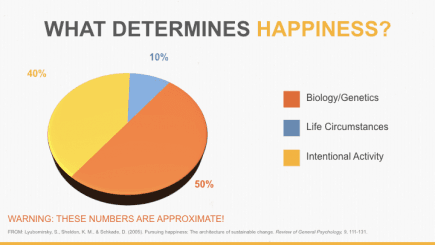How Much Control We Have
Researcher Sonja Lyubomirsky has examined this set-point:
A full 50 percent of our happiness set-point is due to genetics. 10 percent is affected primarily by circumstances like where we were born and to whom. 40 percent is subject to our influence.
211
710 reads
The idea is part of this collection:
Learn more about personaldevelopment with this collection
How to practice effectively
The importance of consistency
How to immerse yourself in the language
Related collections
Similar ideas to How Much Control We Have
The Happiness Pie Chart
The Happiness Pie Chart, first published in 2005, states that 50% of our happiness is defined by our genes, 40% by our activities and 10% by our life circumstances.
Recent studies on what determines happiness prove that it is possible to take deliberate steps to control our happines...
5 Brain myths debunked
- We use only 10% of our brains. PET or fMRI scans show that much of the brain is engaged even during simple tasks. But there's also the fact that highly motivated people score higher on IQ tests, which suggests that we don’t always exercise our minds at 💯% capacity.
- ...
Read & Learn
20x Faster
without
deepstash
with
deepstash
with
deepstash
Personalized microlearning
—
100+ Learning Journeys
—
Access to 200,000+ ideas
—
Access to the mobile app
—
Unlimited idea saving
—
—
Unlimited history
—
—
Unlimited listening to ideas
—
—
Downloading & offline access
—
—
Supercharge your mind with one idea per day
Enter your email and spend 1 minute every day to learn something new.
I agree to receive email updates

